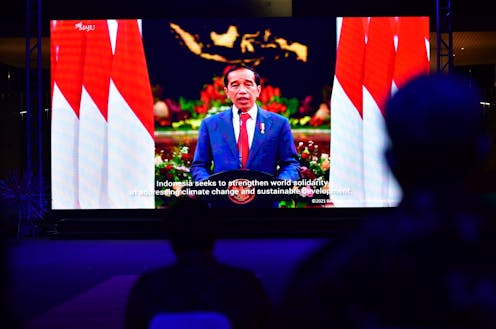
The ongoing war between Russia and Ukraine has threatened the success of this November’s G20 summit in Bali, Indonesia.
The Indonesian government is under the impression that, to ensure the meeting of countries representing 85% of the global’s GDP runs well, it has to somehow become a peacemaker between the warring countries.
Indonesian President Joko “Jokowi” Widodo’s recent diplomatic mission to Russia and Ukraine has reflected this ambition.
But the diplomatic mission has not been proven effective in bringing the two countries together for a peaceful dialogue.
It is important to bear in mind that the ongoing war between Russia and Ukraine has triggered the reemergence of inter-group hostility involving great powers, including Russia, China and the United States (US). It is inevitable and beyond Indonesia’s reach.
In this sense, Indonesia may need to tone down its ambition to be a peacemaker between the warring nations.
A higher bar for the talks, with lower expectations for peace
Instead, Indonesia should focus on making sure the two-day summit runs smoothly, by ensuring all delegates will attend, sit and remain at the meeting room, without walkout dramas, resulting in a productive agreement.
That may not be easy, looking at how various G20 prelude meetings were run.
July’s G20 foreign ministers meeting in Indonesia was boycotted by the G7 countries (Canada, France, Germany, Italy, Japan, the US and the UK) and ended up with Russian Foreign Minister, Sergei Lavrov, walking out of the second meeting session. The meeting failed to produce a joint statement or agreement.
In the same month, the G20 finance ministers’ meeting also failed to produce a joint communique. Attendees were busy attacking each other.
Reflecting to the not-too-smooth G20 lead-up events, aiming to also bring peace to the Russia-Ukraine war looks too ambitious for Indonesia. As the summit host, however, Indonesia at least can drive the discussions so that each topic does not shift to the “blame game”.
The easiest approach to doing is by focusing the dialogues on the topics that are in the common interests of everyone attending the meeting.
Indonesia should avoid direct talks like “how to help end the war in Ukraine” in the meeting, such as about preventing an upcoming global food crisis – the topic that Jokowi brought to his peace mission to Ukraine and Russia though the effect of his trip on overcoming the food crisis remains uncertain.
While Indonesia cannot entirely avoid “war talk” during the G20 meetings, any discussion of that topic needs to be approached cautiously, to steer the dialogue in a way that prevent escalating tension in the room. More sensitive topics are better left for sideline meetings and bilateral negotiations.
It is more important for Jokowi encourage willingness of state leaders to sit together and have a constructive talks, considering that any peace talks between the two warring parties has stopped for a while now.
Indonesia can also utilise its democratic discourse to uphold mutual respect, by calling all countries to de-escalate the tensions and convince them that economic sanctions and public shaming will only lead to prolonged conflicts.
Indonesia’s middle power role amid major power rivalry
With the Westerns nations’ strengthening alliance to contain Russia, and Russia getting closer with China, the global crisis now has exposed a growing rivalry between the US and China.
Both the Russia-Ukraine war and the increased tensions in East Asia following US House of Representatives Speaker Nancy Pelosi’s visit to Taiwan are signs of Russia and China’s efforts to challenge US domination since the end of the Cold War.
Amid such political tension, Indonesia’s position as G20 host, as well as its commitment towards its long-standing principles of “free and active” foreign policy – engaging all parties while keeping balance – is being tested.
In the Russia-Ukraine conflict, Indonesia does not need to express a firm stance or take sides with either one country, because another reason is, geographically, Indonesia is far from the conflict area.
Indonesia’s stance of not taking sides between the two economic giants can be seen by its decision to join the Super Garuda Shield exercises with US and its allies this August, followed by the ratification of China-backed Regional Comprehensive Economic Partnership trade pact within the same month.
What Indonesia has done is right. The country should not be a peacemaker, but rather try to maintain balance and stability in the Asia-Pacific region, by maintaining the status quo of both US and China.
Building peace is still a long way to go and it is unrealistic to hope that the Russia-Ukraine war as well as the tensions between the great powers will end after the G20 summit. However, Indonesia can build trust among them as the first solid foundation to build a meaningful peace process later.
If it can successfully maintain solidity among members and avoid rising tensions that hamper conclusions being made at the summit, that will be a great legacy for Indonesia, and for President Jokowi in particular.
Mireille Marcia Karman does not work for, consult, own shares in or receive funding from any company or organisation that would benefit from this article, and has disclosed no relevant affiliations beyond their academic appointment.
This article was originally published on The Conversation. Read the original article.







